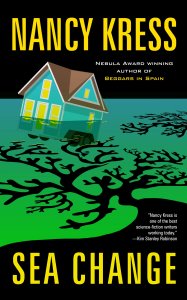2020: As I Liked It; or, Like, Whatever by Russell Letson

For pretty much the reasons anyone can figure, I didn’t get through as many titles as I would usually review in a year. Some anticipated books were held back, but mostly it was lack of appetite on my part – a mild case of what my mother used to call “the blahs” – that condition when energies flag, the palate dulls, and this goodly frame, the Earth, while not quite a sterile promontory, seems to be accumulating an extra layer of quintessence of dust. My response was to abandon adventurousness and focus on books I was likely to enjoy most (for certain senses of “enjoy”). So, even more than usual, this is a report not of the objective state of our genre neighborhood but of my own preferences and tastes and nose-following and state-of-mind. Make of it what you will – you will like these books, if they’re the kind of books you like.
While I might be accused of spending the year comfort-reading, several of these titles produced the opposite of a comfy-cozy-safe feeling. But then, there is a certain gloomy satisfaction in having gifted writers confirm one’s forebodings with tales of physical and human environments gang agley. Christopher Brown’s Failed State is my candidate for the most comprehensively What’s Goin’ On Right Now book of the year: filled with unmistakable echoes of the current news-scape, a predictive scenario of how a perfect storm of environmental and political factors can mean that It Can So Happen Here. Not far behind (if along a very different vector) is Charles Stoss’s Laundry series, which has at its center the thesis that not only this world but any number of other universes are out to get us. The latest iteration, Dead Lies Dreaming, paints a UK-centric picture of nightmare governance, with a nation’s sociopolitical (not to exclude sociopathic) machinery operated by an unholy combination of Earthly and eldritch powers, while ordinary folk supply cheap labor and the occasional sacrificial psychic snack.
 Back in the material world of Linda Nagata’s Pacific Storm, the literal, climate-change-induced stressor of the title provides a special-effects setting for the politics, fanaticism, and betrayals that drive a combination conspiracy thriller, (private) police procedural, and disaster adventure. Nancy Kress addresses a set of slower-moving, week-after-next ecological and social disasters set in her own Pacific Northwest neighborhood in Sea Change, while a farther-future, merely human set of failures is carried to the interstellar frontier by settlers in The Eleventh Gate. Kress has been working on variations on this vision at least since the Beggars sequence, a picture of how human ingenuity giveth and human folly taketh away, and what it costs to deal with the damage.
Back in the material world of Linda Nagata’s Pacific Storm, the literal, climate-change-induced stressor of the title provides a special-effects setting for the politics, fanaticism, and betrayals that drive a combination conspiracy thriller, (private) police procedural, and disaster adventure. Nancy Kress addresses a set of slower-moving, week-after-next ecological and social disasters set in her own Pacific Northwest neighborhood in Sea Change, while a farther-future, merely human set of failures is carried to the interstellar frontier by settlers in The Eleventh Gate. Kress has been working on variations on this vision at least since the Beggars sequence, a picture of how human ingenuity giveth and human folly taketh away, and what it costs to deal with the damage.
In last year’s Perihelion Summer, Greg Egan implicitly argued that what can’t be stopped can still be stood up to with courage and determination and decency. In that novella it was a sudden, catastrophic acceleration of global warming in our own day after tomorrow. In this year’s Dispersion, the challenge is a disease rooted in its world’s utterly different set of spatial dimensions and relations – geometry as metaphysics (or maybe vice versa). Egan’s answer is the same: relentless rationality, persistence, and a rejection of tribalism.
 The variant timelines of William Gibson’s Agency are not ours, but the nodal event that branches off to provide the novel’s settings is the 2016 American election. Wonder what it was about that particular 2016, eh? Of course, alternate histories offer opportunities for funhouse-mirror versions of our own world, what-iffery in the service of satire and warning. As usual with Gibson, it can be hard to distinguish a wacky invention from some mildly exaggerated actual bit of oddball culture or commerce he has run across in his magpie rummage through our real world.
The variant timelines of William Gibson’s Agency are not ours, but the nodal event that branches off to provide the novel’s settings is the 2016 American election. Wonder what it was about that particular 2016, eh? Of course, alternate histories offer opportunities for funhouse-mirror versions of our own world, what-iffery in the service of satire and warning. As usual with Gibson, it can be hard to distinguish a wacky invention from some mildly exaggerated actual bit of oddball culture or commerce he has run across in his magpie rummage through our real world.
More conventionally Out There, far-future adventures, no matter how violent or bizarre, really did prove to be cozy, compared to what I was getting from the monitory bad dreams. In Bone Silence, Alastair Reynolds asserts that the grubby, shabby, and gritty – along with greed, aggression, cruelty, and the rest of the components of melodramatic adventure – are likely permanent features of human society, even millions of years hence and despite the presence of miraculous technologies. Neal Asher (like Charles Stross) sees the universe as a devouring machine. In two volumes of his Polity series, The Human: The Rise of the Jain, Book Three and Lockdown Tales, the monsters are relentlessly material, but there remains something gothic in a setting so haunted by its history of predation, warfare, and extinction. Walter Jon Williams’s Praxis future is, by comparison, a benign place, even if its back-story is one of bloody imperial conquest, extermination, and iron-fisted control. At least there are dinner parties. Fleet Elements interweaves the social, bureaucratic, and violent sides of life in an interstellar space navy at internecine war.
Aliens can be nearly as fallen as humans, as C.J. Cherryh demonstrates in her Foreigner sequence, which this year delivered up two volumes that amount to a single extended narrative. Resurgence and Divergence continue to follow the efforts of a human diplomat and his alien patrons to rearrange the alliances and uncover lurking conspiracies in one of the wilder, woollier, and more dangerous areas of their shared world. What grabs me harder than the (melo)drama of political intrigue or even the chases and escapes and ambushes is the deepening portrait of an alien psychology, culture, and history that manage to produce tensions and conflicts that look from the human angle so much like ours – while resisting the solutions that humans would devise to deal with them.
 Speaking of aliens and intrigue, Ken MacLeod serves up a rationalized fantasy right out of the old Unknown Worlds in Selkie Summer, which takes its protagonist from a romantic encounter with a dangerously seductive creature of northern folklore into something like techno-thriller territory. The shades of Fritz Leiber, Robert Heinlein, and L. Sprague de Camp are nodding with approval.
Speaking of aliens and intrigue, Ken MacLeod serves up a rationalized fantasy right out of the old Unknown Worlds in Selkie Summer, which takes its protagonist from a romantic encounter with a dangerously seductive creature of northern folklore into something like techno-thriller territory. The shades of Fritz Leiber, Robert Heinlein, and L. Sprague de Camp are nodding with approval.
Genuine comfort reading, if of a strenuous kind, came from Beyond the Outposts: Essays on SF and Fantasy 1955-1996, a roundup of reviews and miscellaneous pieces by Algis Budrys that took me to the quite safe precincts of critical-historical observation. Literary critics have been known to draw blood, but it’s metaphorical, and in popular-culture circles probably not even career-threatening.
For what it’s worth, I also re-read The Lord of the Rings for the first time in nearly 50 years, and in it I could see very clearly how Tolkien’s imagination had been shaped by two world wars, and it seems to me as relevant to our present difficulties as any of my 2020 reading. It will be good to eventually come out the other side and be able to say, “Well, I’m back.”
Seven of varying degrees of comfort:
Failed State, Christopher Brown
Beyond the Outposts: Essays on SF and Fantasy 1955-1996, Algis Budrys
Resurgence, C.J. Cherryh
Divergence, C.J. Cherryh
Agency, William Gibson
Sea Change, Nancy Kress
Dead Lies Dreaming, Charles Stross
Russell Letson, Contributing Editor, is a not-quite-retired freelance writer living in St. Cloud MN. He has been loitering around the SF world since childhood and been writing about it since his long-ago grad school days. In between, he published a good bit of business-technology and music journalism. He is still working on a book about Hawaiian slack key guitar.
This review and more like it in the February 2021 issue of Locus.
 While you are here, please take a moment to support Locus with a one-time or recurring donation. We rely on reader donations to keep the magazine and site going, and would like to keep the site paywall free, but WE NEED YOUR FINANCIAL SUPPORT to continue quality coverage of the science fiction and fantasy field.
While you are here, please take a moment to support Locus with a one-time or recurring donation. We rely on reader donations to keep the magazine and site going, and would like to keep the site paywall free, but WE NEED YOUR FINANCIAL SUPPORT to continue quality coverage of the science fiction and fantasy field.
©Locus Magazine. Copyrighted material may not be republished without permission of LSFF.








Hi Russel, I liked the Christopher Brown and Linda Nagata books too, and could add a few others to the list.
Egads, I’m two behind on the Foreigner series.
We’ll have to sit down and talk about it one of these days.
See you then.